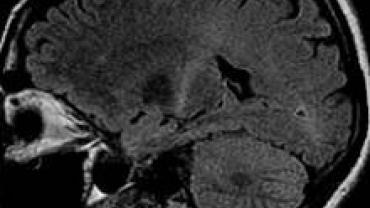
"
Amyotrophic lateral sclerosis (ALS) often referred to as ""Lou Gehrig's Disease is a progressive and eventually debilitating neurodegenerative disease of varying etiology that affects motor neurons in the brain (upper motor neurons) and spinal cord (lower motor neurons). Messages from upper motor neurons are transmitted to lower motor neurons and from there to particular muscles where the nerves together with signals from the brain control muscle movement strength and function. In ALS both the upper and lower motor neurons degenerate or die ceasing to send messages to muscles. Unable to function the muscles gradually weaken and atrophy. The earliest symptoms include fasciculations (muscle twitching) cramping and stiffness and/or muscle weakness. Eventually the ability of the brain to start and control voluntary movement is lost and can lead to total paralysis and even death. For instance when muscles in the diaphragm and chest wall fail patients lose the ability to breathe without the support of a ventilator. Other symptoms that occur later in the disease process include difficulties in speech chewing and swallowing. Patients also face an increased risk of pneumonia during later stages of ALS.
Etiology
The etiology of the disease is complicated and varied with some percentage of the condition being attributed to genetic mutations. Others possible causes include autoimmunity glutamate dysregulation and nerve cell protein damage.
According to the literature there exist other hypothetical causes that have been linked to the disease or which increase the risk of developing ALS. These include celiac disease high homocysteine or homocysteinemia smoking exposure to electromagnetic radiation agricultural chemicals and pesticides.
Most people with the disease have a form called sporadic ALS. This variety occurs in people who have no familial history of the disease and normally do not experience symptoms until they are in their fifties and sixties. Conversely those with the genetic mutation experience symptoms at a somewhat earlier stage in life typically in the forties and fifties. In patients with the sporadic form there is evidence that mitochondrial oxidative damage may be a participating factor in its pathogenesis.
The disease can also cause a form of dementia called frontotemporal dementia which can affect behavior and the personality making it difficult for these types of suffers to have normal social relations.
Researchers have also discovered that this population of patients experience greater levels of overall systemic oxidative stress indicating the importance of raising the body's stores of antioxidants particularly glutathione and super oxide dismutase.
Nutrition support
Therapeutically high dose use of methylcobalamin a form of vitamin B 12 was shown to reduce the progressive decrease of compound muscle action potential increasing survival time and muscle function according to in vivo studies.
As mentioned earlier it appears that mitochondrial dysfunction may be a hallmark of the disease and for many patients the use of coenzyme Q10 at high doses appears to convey benefits including acting as a neuroprotective agent as shown in animal models of the disease.
The green tea extract EGCg demonstrated benefits in a variety of disease markers in animal models including increased lifespan while the polyphenol was also shown to delay the onset of the disease.
Other substances that were shown to increase survival time improve symptomotology or demonstrate improve muscular function in this condition include 5-HTP alpha lipoic acid and the amino acid l-arginine.
Considering the complexity of the etiology of ALS it may be incumbent upon us as clinicians to consider a comprehensive approach when treating these types of patients. This may include investigations into toxic exposure and subsequent need for detoxification modalities mitochondrial function diet and potential allergens which may participate in an autoimmune cascade as well as life style choices and nutritional status. This approach may be our best hope for significantly reducing symptoms while increasing longevity for this population of patients.
by Michael Fuhrman D.C.